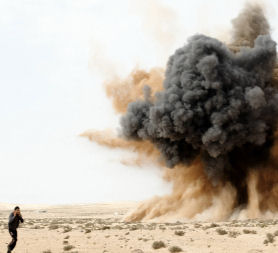Libya: Gaddafi begins fightback in east
Libyan leader Colonel Gaddafi launches a major air and ground assault on protesters and rebels who have taken control of towns and cities in the east. Lindsey Hilsum reports from the frontline.

The assault is the first major fightback of Gaddafi‘s regime since rebels and protesters took control of towns including Brega and Benghazi in the last few weeks, after protests against his 41-year rule of Libya turned violent.
On Wednesday Government troops launched an attack and briefly captured Brega, a town and oil export terminal around 500 miles from Tripoli, which remains Gaddafi’s stronghold. But opposition forces said they had reclaimed the town and were ready to move west to Tripoli if Gaddafi refused to step down.
Fighter jets pounded Brega and nearby Ajdabiya, but residents armed themselves with whatever weapons they could find and remained defiant in the face of the assault. A local hospital reported that eleven people had been killed and 27 injured.
The Foreign Office is investigating reports that a father of seven from Manchester is among the dead. Friends of Khaled Attghdi, from Whalley Range, say that he was shot and killed in the port of Brega yesterday. It’s believed that he travelled to Libya to rescue his 20 year old daughter who is in Tripoli. The circumstances of his death remain unclear, with one friend saying “he was defending himself”.
In Benghazi, a city which remains firmly in rebel hands, the leadership called for international help with airstrikes on the strongholds of the mercenaries they believe are fighting for Gaddafi.
Read more: Afghanistan's Karzai says West should 'absolutely' stay out of Libya
Gaddafi also remained defiant, proclaiming again that he would not stand down, and warning of a “bloody war” if there was any foreign intervention.
“We will enter a bloody war and thousands and thousands of Libyans will die if the United States enters or NATO enters. We are ready to hand out weapons to a million, or 2 million or 3 million, and another Vietnam will begin.”
Gaddafi ‘could be enjoying’ power struggle
Reports suggest at least 2,000 people have died in the uprising, inspired by similar unrest which unseated leaders in Tunisia and Egypt. But Gaddafi maintained only 150 people had died in protests he said were lead by al-Qaeda.
The United States warned that the violence could turn into civil war if it continued.
A Middle East expert told Channel 4 News that the leader could well be enjoying the power struggle.
For the international community, what’s irritating is that this constitutes an enjoyable period for Gaddafi. Dr Rosemary Hollis
Dr Rosemary Hollis, Professor of Middle East Policy Studies at City University, said: “”The opposition to Gaddafi picked up momentum rapidly, leading to euphoria, that it was only a matter of time until he fell. But as Saif Gaddafi put it, Tripoli contains at least a third of the population. Without Tripoli, you have not got the country…At some stage the ability of the Government or the opposition to feed people has to be of international concern. In humanitarian terms, there is international interest in a rapid conclusion to this face off. But it looks to me like it will take a while…
“For the international community, what’s irritating is that this constitutes an enjoyable period for Gaddafi. He is so obsessed with power – he will thrive on this.”
Humanitarian crisis
Thousands continue to flee the country across the borders, prompting warnings of a humanitarian emergency.
On Wednesday, Britain has pledged to help with the growing crisis. Speaking at Prime Minister’s Questions, David Cameron said 1,500 tents and 36,000 blankets have been flown out whilst several thousand migrant Egyptian workers stranded at the Tunisian border would be airlifted back to their homeland by British planes with 6,000 Egyptians to be transferred by three planes working on rotation.
Save The Children has launched an appeal for children caught up in the violence. It estimates that up to one million children could be at risk.
A spokesman said: “Children we have spoken to in Libya have been telling us how frightened they are of what could happen next, from running out of food to being orphaned by the violence. It absolutely essential that we are ready to help as soon as we can reach them.”
Read more: Channel 4 News Special Report on the Arab revolts
-
Latest news
-
As India goes to the polls in the world’s largest election – what do British-Indians think?6m

-
Tees Valley: Meet the candidates in one of the biggest contests coming up in May’s local elections4m

-
Keir Starmer says public sector reform will be a struggle7m

-
Nicola Sturgeon’s husband Peter Murrell charged with embezzlement of funds from SNP1m

-
Ukraine might finally get $60billion in American weapons and assistance to defend against Russia3m

-




